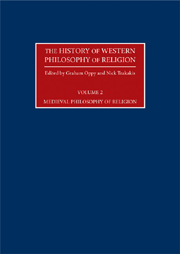Book contents
- Frontmatter
- Contents
- Editorial Introduction
- Contributors
- 1 Medieval Philosophy of Religion: An Introduction
- 2 Boethius
- 3 Johannes Scottus Eriugena
- 4 Al-Farabi
- 5 Avicenna (Ibn Sina)
- 6 Anselm of Canterbury
- 7 Al-Ghazali
- 8 Peter Abelard
- 9 Bernard of Clairvaux
- 10 Averroes (Ibn Rushd)
- 11 Moses Maimonides
- 12 Roger Bacon
- 13 Thomas Aquinas
- 14 John Duns Scotus
- 15 William Ockham
- 16 Gersonides
- 17 John Wyclif
- 18 Nicholas of Cusa
- 19 Erasmus of Rotterdam
- Chronology
- Bibliography
- Index
9 - Bernard of Clairvaux
- Frontmatter
- Contents
- Editorial Introduction
- Contributors
- 1 Medieval Philosophy of Religion: An Introduction
- 2 Boethius
- 3 Johannes Scottus Eriugena
- 4 Al-Farabi
- 5 Avicenna (Ibn Sina)
- 6 Anselm of Canterbury
- 7 Al-Ghazali
- 8 Peter Abelard
- 9 Bernard of Clairvaux
- 10 Averroes (Ibn Rushd)
- 11 Moses Maimonides
- 12 Roger Bacon
- 13 Thomas Aquinas
- 14 John Duns Scotus
- 15 William Ockham
- 16 Gersonides
- 17 John Wyclif
- 18 Nicholas of Cusa
- 19 Erasmus of Rotterdam
- Chronology
- Bibliography
- Index
Summary
Bernard of Clairvaux (1090–1153) was not a philosopher in the strict sense of the word. His writings, however, have an epistemological foundation and belong to a perennial discussion within Christian thought about the relationship between faith and reason. Thus the great historian of medieval philosophy, Etienne Gilson, had no qualms about including Bernard in his History of Christian Philosophy in the Middle Ages. In a chapter called “Speculative Mysticism”, Gilson showed how Bernard described a process by which the human soul seeks the love that God offers: “Ecstasy is nothing else than the extreme point of this union of wills and this coinciding of a human love with the divine” (Gilson 1955: 167).
Bernard was born into a family of the lower nobility at a castle just outside of Dijon, Fontaines-lès-Dijon, in Burgundy. He was educated by canons in the town of Châtillon-sur-Seine. They seem to have encouraged the great love of Latin letters that is reflected in his writings. He apparently intended to continue his education in the manner of the wandering scholars of his era. According to a story included in his hagiography, Bernard was on his way to study in Germany, but the recollection of his mother, who had recently died, made him turn back and become a monk (William of Saint-Thierry, Sancti Bernardi vita prima [The first life of Saint Bernard; hereafter Vita prima] 1.3.9, in Patrologia Latina [hereafter PL] 185:231–2).
- Type
- Chapter
- Information
- The History of Western Philosophy of Religion , pp. 109 - 120Publisher: Acumen PublishingPrint publication year: 2009

